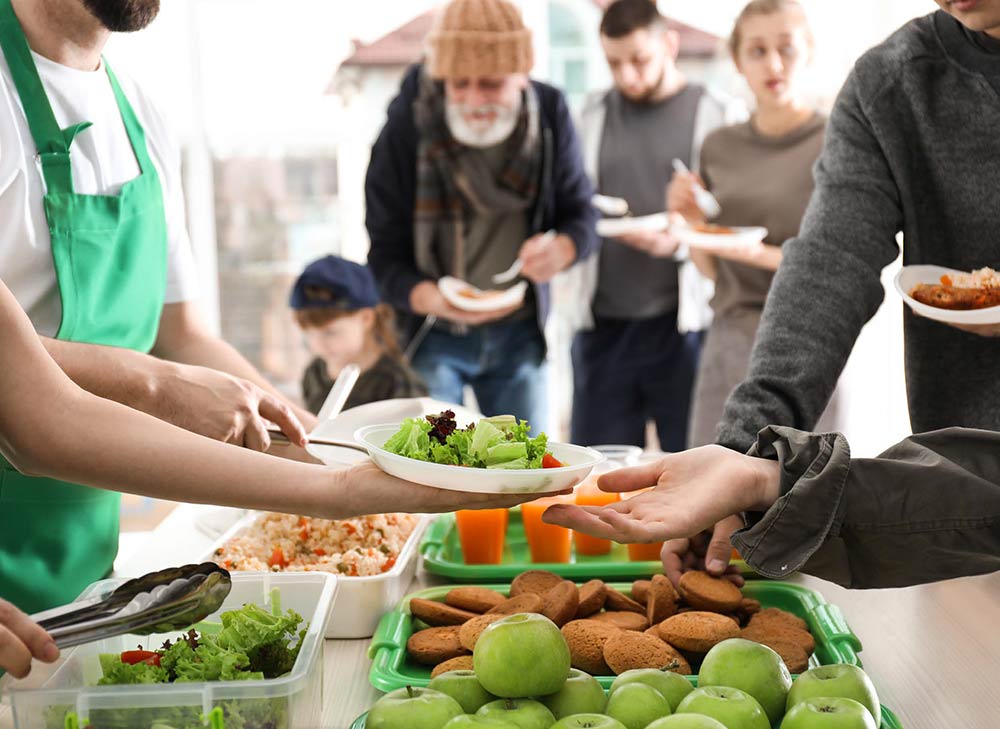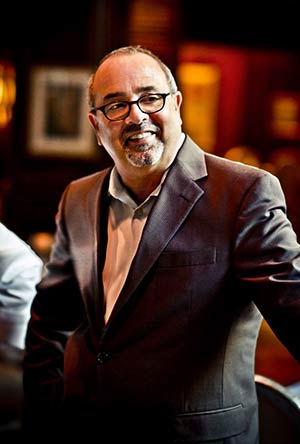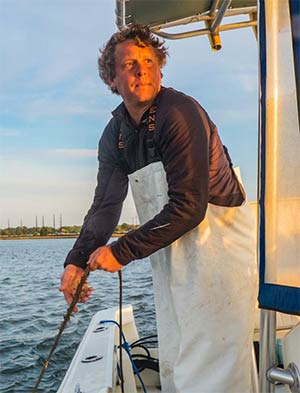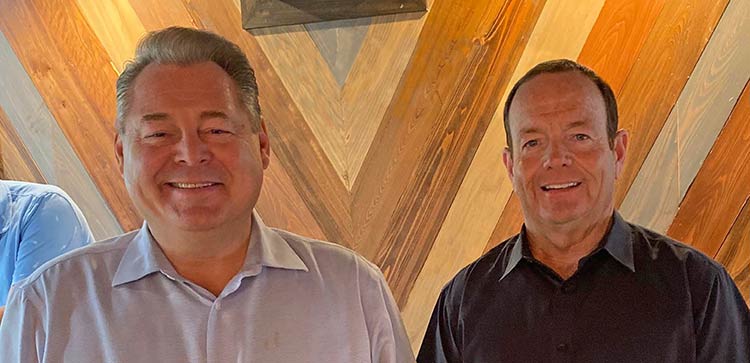
There’s an Audrey Hepburn quote that says, “You have two hands: one for helping yourself, the other for helping others.” So what drives people to help others and make their community a better place? Well, that’s a loaded question. It depends on the person, depends on their experiences, their workload, their passion and their ability – physically, mentally and financially. What strikes your fancy may not be the fanciest to your neighbor. But, for the most part, doing good for the community is a good thing to do.
I had a chance to sit down with some local restauranteurs who hold their service to the community to the same high standards as the dishes they serve in their restaurants. This is by no means a list of who does what better, or who does the most, but moreso a glimpse into how much good can come from this industry – just a taste. Their stories run the gamut, but even from this small sampling, it is incredibly uplifting to know that despite busy schedules and doing all that it takes to run a business, these guys still find the time – and somehow find a lot of time – to help others.
MICKEY BAKST

Mickey Bakst.
It was in 2008 when the economy collapsed that Mickey Bakst, general manager of Charleston Grill, read that a local homeless shelter was unable to feed the homeless each day and was going to close down food service. “I walked my dog that morning thinking, ‘This is bullsh*t, I can do something.’ I realized that ultimately I can’t, but we could,” Bakst recalled. So he – and they – did.
The restaurant industry veteran reached out to his colleagues and created a 501c3 called Feed the Need. “We do it about 80 times a year now. Area restauranteurs donate their time, their product and their staff to go into shelters around the community and feed the hungry. Every week there are one or two lunches being served under the name Feed the Need for as many as 400 people each meal.”
But Bakst felt that more could be done, so he started yet another nonprofit, Teach the Need. “It wasn’t enough to feed people. We needed to teach people how to earn the funds to feed themselves,” he explained. Teach the Need is geared towards teaching skills necessary for the hospitality industry to high school seniors from at-risk homes. The students take a seven-week training course and then are helped with job placement upon completion.
“There are tons of success stories with this program. We have students working all around town who went through Teach the Need. They’re working in different restaurants from Halls to Kiawah to Charleston Grill to 82 Queen,” he beamed.
Three years ago, Bakst and his friend, Steve Palmer, started an organization called Ben’s Friends after Palmer’s friend and chef, Ben Murray, took his own life due to his addiction. “Drugs and alcohol really wreak havoc on our industry. We got sick and tired of people destroying their lives,” Bakst explained.
Though not affiliated with AA, Ben’s Friends has a similar approach, but is specifically for people in the restaurant industry who wish to stop drinking or using drugs. An average of 20 to 25 people show up for the regular Sunday meetings, usually hosted by Bakst or Palmer, and the program has gained traction around the country. There are now Ben’s Friends groups in 10 cities around the nation, with more on the list for the future.
These programs are only the tip of the iceberg for Bakst, whose campaigns have raised hundreds of thousands of dollars for groups like the Charleston Nine firefighter families, the Emanuel Nine families and Katrina victims.
When asked what drives him to do these things, his answer was simple: “I can.” “And my wife Ellen, of course. She gives me the strength and motivation to keep it going. But here’s the reality: in our community – and every community – there are people who need. If you’re a person who has and a person who can, the question I would ask is, ‘Why wouldn’t you?’”
JONATHAN KISH

Jonathan Kish.
The CEO of Queen Street Hospitality has made community support and helping others part of his everyday as chairman of the Charleston Restaurant Foundation. Its annual major event is the Lowcountry Oyster Festival, which benefits local schools that focus on culinary education. But his newest community-oriented focus was borne from the government shutdown in early 2019.
“We started looking at the affects that can happen long-term for government workers who were without a job for a long period of time. And that led us to looking at school lunch debt, specifically in the tri-county area of Charleston,” Jonathan Kish said. At the time, he said, local schools had racked up between $300,000 to $400,000 in lunch debt. By the spring, Kish saw that the debt had ballooned to $600,000.
So he and his wife, McKenzie, combined forces with the Charleston Restaurant Foundation, I Heart Hungry Kids and Lowcountry Blessing Box Project to create Catch Up On Lunch. Together, they raise funds and awareness to help alleviate the problem.
“Looking at the school lunch debt, it’s evident that there is a problem. Kids are going to school, they don’t know if they’re going to be able to eat a meal. And they’re getting shame from the schools,” Kish elaborated. “It’s not the kids’ fault. It’s not necessarily the parents’ fault, but it should be a basic right to have a meal in school. Some schools have that as a basic right, some don’t.”
Still a fledgling nonprofit, Catch Up On Lunch raised over $25,000 in its first year, largely through monetary donations and proceeds from “spirit night” fundraisers held at local restaurants. The funds have, so far, paid off the lunch debt for all students at four schools in the tricounty area.
Catch Up On Lunch’s ripple effect reaches farther than just the lunch debt itself. “Otherwise, the schools absorb the debt, and it makes a big difference in their budget. It turns into a bigger problem for the schools, and then they have to ask questions like, ‘We have a lunch debt at the end of the year that we won’t be able to collect on. In that case, can we afford another teacher? Can we afford supplies?’ It’s more than just students not eating in school, it’s also that schools have to make other decisions based on their budgets,” he said.
For Kish, the best part about Catch Up On Lunch is the impact it has on the children and their families. He recalled a situation in which over half of one school’s $3,000 lunch debt had been accumulated by two children from the same family. “It wasn’t the kids, it wasn’t the parents. They had fallen on hard times, and school lunches were something they couldn’t afford,” Kish explained. “For a family falling behind, Catch Up On Lunch can make a huge impact.”
ANDREW CARMINES

Andrew Carmines.
Every cloud has a silver lining, as the saying goes. For Andrew Carmines, the cloud of losing his brother David to cancer in 2002 has garnered a beautiful silver lining for the Hilton Head Island community. His parents had been running Hudson’s Seafood House since the 1970s, which Andrew had worked in as a youngster. He later became its manager, and Hudson’s became the home base for a handful of fundraisers like golf and fishing tournaments and the DMC Water Festival in David’s honor, which were well-supported by a few hundred people in the community. The water festival soon outgrew Hudson’s patio, and the Carmines renamed it the Hilton Head Island Seafood Festival and moved locations.
“Over the past 10 years, it has grown to become a week-long celebration of food and seafood and the water,” Andrew beamed. “Last year, we raised $240,000 for local charities.”
The seafood festival offers all sorts of perks: local chefs from the James Beard Foundation cook and do demos, May River Excursions takes people out for oystering and shrimping outings and returns to Hudson’s to cook their fresh catch at the restaurant. There’s a pig picking, paddle boarding and on-beach media panels on things like sustainability and Southern food. With 10,000-14,000 attendees, there really is something for everyone.
“It’s exceeded my wildest dreams. The town has recognized its significant impact to the economy, and they give us tax dollars to support the event,” he said. He and his family are strong supporters of the environment and, through the event, have donated close to $1 million to support these local charities.
But the seafood festival is not the only way the Carmines are making a difference on the island. For nearly three decades, the family has been hosting a community Thanksgiving dinner at Hudson’s.
It started humbly enough when the Carmines opened their doors to the public for anyone who had nowhere to go on Thanksgiving. Food was purchased by a church, and volunteers prepped and served it to a crowd of about 175 that first year.
Today, their Community Thanksgiving Dinner feeds about 1,400 people free-of-charge. “Everyone is welcome. We have the ability to serve those who are really in need without making them feel self-conscious about it, because people of all walks of life show up and sit with people they’ve never met. Patrons of the restaurant come. There are over 200 volunteers. It’s remarkable, you have to see it to understand how good you feel at the end of the day.”
For Andrew, the best part of these avenues to support the Hilton Head Island community is that none of it feels like work. “It’s so enjoyable and amazing to be able to do something like the Hilton Head Island Seafood Festival. While you’re having a great time, you’re actually supporting charities. And it’s the same with the Thanksgiving dinner. It benefits a lot of people, but it’s fun at the same time.”
WADE BOALS AND BRETT YEAROUT

Wade Boals (left) and Brett Yearout (right).
Wade Boals and Brett Yearout are partners in business under an umbrella of restaurants in the area like Saltwater Cowboys and Hooked Seafood. For 13 years, they have worked to serve more than 300 meals each month to seniors and others in need through East Cooper Meals on Wheels – that’s over 46,000 free meals. According to Boals, they are the only restaurant in the area who does this.
“The recipients are used to getting a generic lunch. We take the opportunity to give them a first-class restaurant meal,” Boals explained. Boals and Yearout started doing the ECMOW lunches when they owned Noisy Oyster, and continue providing them, now from the Saltwater Cowboys kitchen on the first Wednesday of every month.
Boals is a board member of East Cooper Meals on Wheels. “My family would do a route every Thanksgiving while my kids were growing up. They grew up seeing this and meeting the people. We did the same route every year. It was really special.”
The pair helped fund the Magdalene House of Charleston by donating the home several years back. The nonprofit provides a safe haven and a helping hand for women who have been incarcerated for drug abuse or related crimes. “This is a two-year program where women can stay in a loving, caring place. They receive help to get back on their feet, find a job and become self-sufficient. It breaks the vicious cycle,” Yearout explained.
“God blessed us financially, and we wanted to give back,” Boals added. “But we didn’t want to just write a check because that gets lost in the bureaucracy. When we read in the paper that a reverend wanted to start a Magdalene House, we bought a house for them.”
Aside from their charitable endeavors together, partners Boals and Yearout volunteer separately in ways that are more personal.
For Boals, serving comes first. He was diagnosed with prostate cancer at a relatively young age – younger than the recommended screening age – and now speaks with men prior to surgery as part of a newly-formed program with Roper Hospital. “I tell them different things to expect before and after surgery. There are some things the doctors don’t tell you. Being a survivor, I know what it’s like. I tell them.”
For Yearout, working in the addiction recovery world is his passion. He has been in recovery since 2004, and has spent three years in graduate school for clinical psychology. He is currently interning, serving clients at East Cooper Community Outreach, and counsels them on a range of issues from marriage to addictions. “The free counseling is part of the pathway to reaching my goal to become an addictions counselor,” he smiled.
So the pair, together or separate in their volunteer ambitions, continue doing good in the community. In the spirit of causing a positive ripple effect, Boals concluded, “We would like to challenge any other East Cooper restaurant to pick up another day for East Cooper Meals on Wheels.”
By Anne Shuler Toole

These men and their families are committed to their cause. Bravo!!!! Now think about one thing you can do for your community and seek it out. I am sure you will benefit from your commitment.